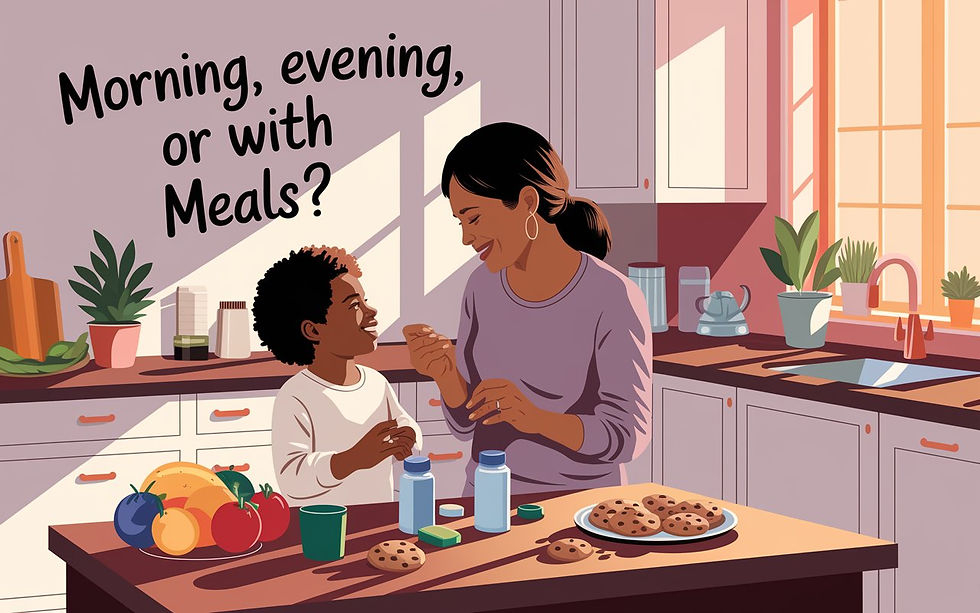Does Your Child Really Need Vitamin D and Calcium Supplements? A Pediatric Guide
- gumazing2
- May 17
- 4 min read
As parents, we want to make sure our kids are getting everything they need to grow up strong and healthy. From balanced meals to daily routines, there’s always something to think about. One of the most common concerns among parents is whether their child needs Vitamin D and calcium supplements.
You may have seen these supplements at the pharmacy or heard other parents talking about them. But are they really necessary for your child? Or is it just another health trend?
In this blog, we’ll break down the facts, clear up common myths, and help you understand when and why these supplements might actually help.

Why Do Kids Need Vitamin D and Calcium?
Calcium helps build strong bones and teeth. Without enough calcium, children might not reach their full growth potential or may develop weak bones. Vitamin D plays a big role by helping the body absorb calcium properly. Without it, even a calcium-rich diet might fall short.
Doctors often say these two nutrients work as a team: calcium builds, and vitamin D delivers. When kids don’t get enough of either, it can lead to problems like slower growth, weak bones, or fatigue.
Signs Your Child May Be Deficient
Not every child needs supplements, but some might—especially if they're:
Not drinking enough milk or eating dairy
Avoiding sun exposure (which helps the body make vitamin D)
Following a vegan or restricted diet
Experiencing frequent bone or muscle aches
Pediatricians can check for these deficiencies through simple blood tests if needed.
If your child avoids milk or dairy products, a doctor may recommend vitamin gummies. These chewable supplements are a parent favorite because kids enjoy the taste, and they often include key nutrients like calcium and vitamin D in one serving. Just make sure to check the sugar content and follow the dosage based on age.

What Science Says About Supplementation
According to the American Academy of Pediatrics, children aged 1–18 need 600 IU of vitamin D daily. Many kids fall short of this number—especially those who live in colder climates or spend a lot of time indoors.
While calcium can often be found in food, like yogurt, cheese, or leafy greens, vitamin D is harder to get through a diet alone. That’s where multivitamin gummies can help fill in the gaps—especially for picky eaters or children on restricted diets.
Still, supplements should be treated as a backup, not a replacement. A healthy diet and lifestyle should always come first.
In some cases, pediatricians may suggest vitamin D3 liquid drops instead of gummies, especially for younger children or babies. Drops are easier to swallow and can be mixed with food or milk. Many parents find this method more convenient for infants who can't chew yet.
These liquid drops are typically pure and contain fewer additives, making them a great option if your child has allergies or sensitivities. It’s important, however, to stick to the prescribed dosage—too much vitamin D can be harmful over time.
When Are Vitamin D Supplements Really Needed?
There are certain times when children may absolutely need vitamin D supplements:
If your child is breastfeeding (breast milk alone doesn’t provide enough vitamin D)
During winter months when sunlight exposure is limited
If your child has dark skin, which can lower vitamin D production from sunlight
If your child has a medical condition that affects nutrient absorption
Always talk to your pediatrician before starting any new supplement. What works for one child may not be right for another.
Conclusion: Do Kids Really Need Vitamin D and Calcium Supplements?
The answer is—sometimes. If your child gets enough through their diet and spends time outdoors, they might not need extra supplements. But if they avoid dairy, have limited sun exposure, or follow a restricted diet, they could benefit from Vitamin D and calcium supplements.
Remember, supplements are just one part of the big picture. Focus on balanced meals, regular outdoor play, and open conversations with your child’s doctor. With the right approach, you’ll be able to support your child’s health and development with confidence.
Frequently Asked Questions (FAQs)
1. Can my child get enough vitamin D and calcium from food alone?
Yes, some children can meet their needs through a balanced diet and sunlight. Foods like dairy, leafy greens, and fish help, but many kids still fall short—especially with limited sun exposure.
2. Are vitamin D and calcium supplements safe for daily use?
Yes, if taken at the correct dose. Always follow your pediatrician’s guidance to avoid over-supplementation.
3. What’s the best form of vitamin D for children?
It depends on the child’s age. Liquid vitamin D3 drops are great for infants, while vitamin gummies or chewables are often preferred for older kids.
4. How do I know if my child has a vitamin D or calcium deficiency?
Common signs include fatigue, bone pain, muscle weakness, or delayed growth. A blood test from your pediatrician can confirm a deficiency.
5. Can too much vitamin D or calcium be harmful?
Yes. High doses can cause nausea, kidney issues, or other complications. Always stick to recommended amounts and consult a healthcare provider.



Comments